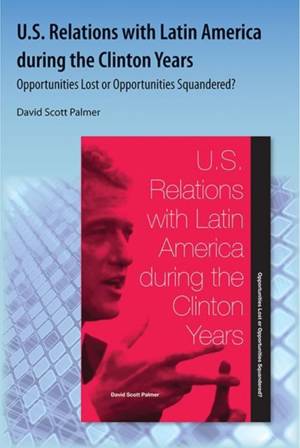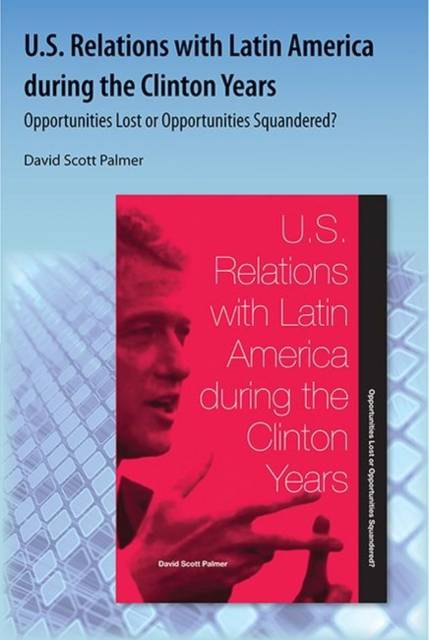
Door een staking bij bpost kan je online bestelling op dit moment iets langer onderweg zijn dan voorzien. Dringend iets nodig? Onze winkels ontvangen jou met open armen!
- Afhalen na 1 uur in een winkel met voorraad
- Gratis thuislevering in België vanaf € 30
- Ruim aanbod met 7 miljoen producten
Door een staking bij bpost kan je online bestelling op dit moment iets langer onderweg zijn dan voorzien. Dringend iets nodig? Onze winkels ontvangen jou met open armen!
- Afhalen na 1 uur in een winkel met voorraad
- Gratis thuislevering in België vanaf € 30
- Ruim aanbod met 7 miljoen producten
Zoeken
U.S. Relations with Latin America During the Clinton Years
Opportunities Lost or Opportunities Squandered?
David Scott Palmer
Paperback | Engels
€ 33,45
+ 66 punten
Omschrijving
A balanced, nuanced overview of U.S. relations with Latin America during the Clinton presidency. The case studies are particularly helpful in assessing both what more might have been accomplished if greater attention had been given to the region and the constraints that often made it appear difficult or almost impossible to act more boldly."--Riordan Roett, Johns Hopkins University "An insightful, scholarly work dealing with events as they unfolded and the political and bureaucratic milieu that influenced their outcome."--Charles D. Ameringer, Pennsylvania State UniversityThe first book-length treatment of the Clinton administration's Latin American policies, this timely study reads like an insider's account, based in part on interviews and roundtable discussions with more than 50 participants in the Latin American foreign policy process during these years--from career diplomats to political appointees, White House insiders to jaded professionals. In his balanced analysis of an administration that made some progress in Latin American relations, the author reluctantly concludes that the Clinton presidency failed to build on the favorable international and regional context and on opportunities inherited from the George H. W. Bush administration.The study offers a multifaceted explanation for why Clinton's Latin American policy was, on balance, not able to accomplish many of its objectives in spite of some important successes, including the ratification of the North American Free Trade Agreement (NAFTA) and the historic Summit of the Americas. Citing the collapse of the Governor's Island accords to return democracy to Haiti and Clinton's reluctant signing of the Helms-Burton bill that imposed new restrictions on Cuba as among the administration's failures, the author allows that policymakers were often handicapped by limitations of leadership at various levels, bureaucratic politics, a lack of resources, unexpected events, competing policy priorities, and the influence of domestic politics.In addition, Clinton and his senior-level advisers showed only sporadic interest in Latin America, which, among other factors, had the effect of hamstringing mid-level policy advocates. Such constraints, rather than a lack of vision or a failure to articulate policy objectives, appear to explain why the administration failed to exploit effectively the historic opening for a new post-Cold War approach to U.S.-Latin American relations. This timely study will be a valuable reference for the foreign policy community at large and for students and scholars of international relations.David Scott Palmer is professor of international relations and political science at Boston University. He previously served as director of Latin American and Caribbean Studies at the Foreign Service Institute of the U.S. Department of State.
Specificaties
Betrokkenen
- Auteur(s):
- Uitgeverij:
Inhoud
- Aantal bladzijden:
- 144
- Taal:
- Engels
Eigenschappen
- Productcode (EAN):
- 9781616101428
- Verschijningsdatum:
- 5/03/2010
- Uitvoering:
- Paperback
- Formaat:
- Trade paperback (VS)
- Afmetingen:
- 152 mm x 229 mm
- Gewicht:
- 222 g

Alleen bij Standaard Boekhandel
+ 66 punten op je klantenkaart van Standaard Boekhandel
Beoordelingen
We publiceren alleen reviews die voldoen aan de voorwaarden voor reviews. Bekijk onze voorwaarden voor reviews.











